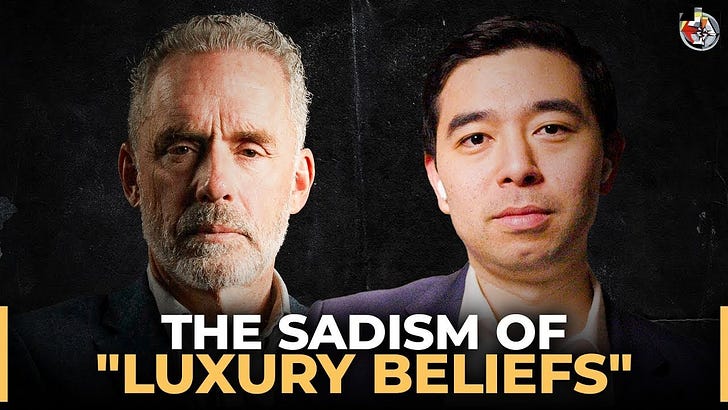
You can now watch or listen to my second conversation with Jordan Peterson on his podcast. A deep dive into the power of stories, the Dark Tetrad personality traits, evolutionary mating strategies, fragmented families, and much more:
Links for Spotify and Apple Podcast.
Some of interesting tidbits from our conversation:
Victim signaling, defined as 'public and intentional expressions of one’s disadvantages, suffering, oppression, or personal limitations' is strongly correlated (r = .52) with Dark Triad personality traits
The best predictor of politically correct authoritarianism is low verbal intelligence (r = -.51)
Those are both massive statistical relationships in psychological research. For context, the correlation between height and weight is typically around r = .6, the correlation between married spouses’ education level is about r = .5, and the correlation between intelligence and income is r = .3
People who have high levels of wealth and status also express the strongest desire for wealth and status. People who report the highest levels of earnings, education, and occupational prestige are also the most likely to agree with statements such as “It would please me to be in a position of power over others”
I didn’t mention this in the discussion, but this is arguably an indicator of a relatively fair society—the people who most strongly crave status are also the most likely to attain it. Related post here
Although many people claim that their sexuality is fundamental to who they are, very few people will say that their actual sexual past is fundamental to who they are
Elite university graduates are perfectly open and often eager to publicly speak about their race, gender, and sexual orientation. However, there is one marginalized identity they often conceal: coming from a low socioeconomic status background. Elite graduates hide being poor, and interestingly they also hide being rich (they hide economic capital but still display cultural capital in the form of arcane knowledge, conversations about traveling in exotic locales, and luxury beliefs). Despite all the rhetoric around equity in elite universities and firms, the marginalized attribute that is arguably the most difficult—growing up in poverty—is the one people don’t feel comfortable disclosing. Don’t expect this to change any time soon
There’s an inverse relationship between age and Dark Triad personality traits; relative to older adults, young adults score higher on narcissism, psychopathy, and Machiavellianism
My discovery that I’m half Hispanic on my father’s side. “I went to bed white adjacent and woke up an underrepresented minority.”
The archetypal pathological mother is overbearing, overinvolved, and overprotective. In contrast, the archetypal pathological father is simply absent. Not tyrannical. Not abusive. Not violent. Just not there
Jordan says something that increases my confidence that stories and narratives played an important role in my life trajectory
There’s much more—we went more than two hours in total. Hope you enjoy.
Book reviews
Here are a few new reviews and discussions of my book:
Skewering ‘luxury beliefs,’ with a past informed by foster-care chaos by George F. Will (ungated here)
"Henderson says, 'We now live in a culture where affluent, educated, and well-connected people validate and affirm the behaviors, decisions, and attitudes of marginalized and deprived kids that they would never accept for themselves or their own children.'"
Misery Loves Company by Helen Dale
"The way Henderson shifts gear...producing a searing analysis of poverty, class, and the value of family while launching ordnance at people who’ve landed on 'Free Parking' in the Monopoly game of Life—is astonishing."
Light from darkness: Rob Henderson’s pitch-perfect concept of “luxury beliefs” by Patrick Nash
"Bleak as his start in life was, however, Henderson has mercifully not penned a misery-memoir. On the contrary, Troubled is a serious piece of scholarship told through a redemptive but unsentimental autobiographical arc."
A conversation with Rob Henderson on his bestselling book, and how elites don’t practice what they preach by Hanna Seariac
“Even if having an intact, stable, loving home with two married parents has zero impact on college graduation rates and the likelihood of future incarceration and so on, we should still promote loving, stable, secure families for kids, because the emotional pain of a child is still important, regardless of their future."
Troubled: A Memoir of Foster Care, Family and Social Class by Thomas Foydel
And a reminder to please leave your reviews on Amazon and Goodreads
You can order your copy of Troubled (now a National Bestseller!):
Audible (I narrated the audiobook myself)
Reading list
I’ve spent several months compiling a list of the most interesting and impactful books I’ve ever read.
The list contains my mini-reviews summarizing each book and explaining its importance.
If you are interested in getting it, just follow these two steps:
1. Order a copy of Troubled: A Memoir of Foster Care, Family, and Social Class in whatever format you want (print, ebook, or audiobook)
2. Send a screenshot or photo of your receipt or proof of purchase to the email address troubledmemoir@gmail.com and use the subject line SECRET READING LIST
Already purchased a copy? Just send a screenshot of your receipt to troubledmemoir@gmail.com with the subject line SECRET READING LIST and you’ll get the secret reading list right away.
That's it!
And if you don’t receive it within 24 hours, please check your spam/junk.
Initially, the secret reading list was available only to those who pre-ordered. But so many people continue to request the list, that I’m now offering it for anyone who has purchased a copy of Troubled. Again, I also put a lot of work into the list, and hope more people find it valuable.











It’s incredible that this boy who we know through your memoir, is now having two hour conversations with Jordan Peterson. That should give us hope about America.
"Jordan says something that increases my confidence that stories and narratives played an important role in my life trajectory."
I've long observed how people seem to conform themselves to their preferred narrative arcs. This is particularly obvious among certain types of young women.